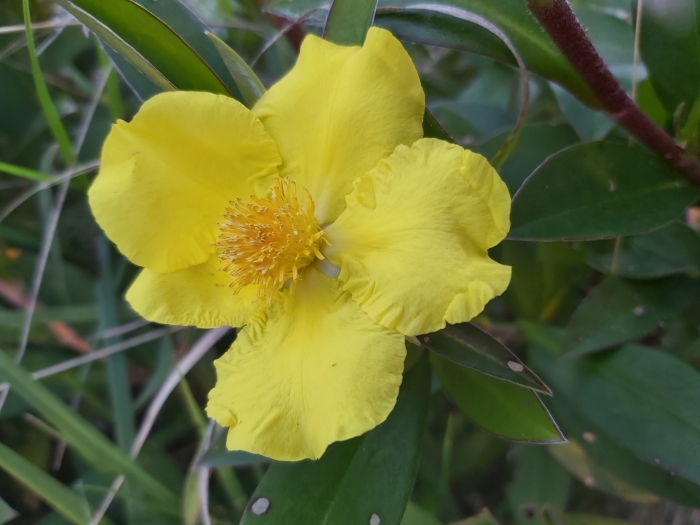Snake Vine
(Hibbertia scandens)
Snake Vine (Hibbertia scandens)
/
/

Tim
CC BY 4.0
Image By:
Tim
Recorded By:
Copyright:
CC BY 4.0
Copyright Notice:
Photo by: Tim | License Type: CC BY 4.0 | License URL: http://creativecommons.org/licenses/by/4.0/ | Rights Holder: Tim | Publisher: iNaturalist | Date Created: 2020-07-06T15:59:55-07:00 |





















































Estimated Native Range
Summary
Hibbertia scandens, commonly known as Snake Vine, Climbing Guinea Flower, or Golden Guinea Vine, is a climbing or scrambling evergreen perennial native to coastal rainforests and open forests in eastern Australia. It typically grows as a dense, twining vine reaching lengths of up to 5 meters. The plant features lance-shaped or egg-shaped leaves with the narrower end towards the base, and bright yellow flowers that are particularly showy, with more than thirty stamens encircling three to seven glabrous carpels. Flowering occurs mainly in spring and summer, adding a vibrant display to the garden.
Hibbertia scandens is valued for its adaptability to a wide range of conditions and its ability to withstand salt-laden winds, making it suitable for coastal plantings. It thrives in full sun, which encourages prolific flowering, but can also grow in semi-shaded areas. The plant prefers well-drained soil and requires moderate watering, especially during dry periods. While it is only hardy to 5 °C (41 °F), it can be grown in temperate regions with winter protection. It has received the Royal Horticultural Society’s Award of Garden Merit, indicating its excellence for garden use. Commonly used as a ground cover or for trellises and fences, it can also be effective in hanging baskets. Gardeners should be aware that it may require regular pruning to maintain shape and prevent overgrowth.CC BY-SA 4.0
Hibbertia scandens is valued for its adaptability to a wide range of conditions and its ability to withstand salt-laden winds, making it suitable for coastal plantings. It thrives in full sun, which encourages prolific flowering, but can also grow in semi-shaded areas. The plant prefers well-drained soil and requires moderate watering, especially during dry periods. While it is only hardy to 5 °C (41 °F), it can be grown in temperate regions with winter protection. It has received the Royal Horticultural Society’s Award of Garden Merit, indicating its excellence for garden use. Commonly used as a ground cover or for trellises and fences, it can also be effective in hanging baskets. Gardeners should be aware that it may require regular pruning to maintain shape and prevent overgrowth.CC BY-SA 4.0
Plant Description
- Plant Type: Vine
- Height: 4.5-8.5 feet
- Width: 3-5 feet
- Growth Rate: Moderate
- Flower Color: Yellow
- Flowering Season: Spring, Summer
- Leaf Retention: Evergreen
Growth Requirements
- Sun: Full Sun
- Water: Medium
- Drainage: Medium
Common Uses
Bee Garden, Butterfly Garden, Drought Tolerant, Low Maintenance, Potted Plant, Rock Garden, Salt Tolerant, Showy Flowers, Street Planting
Natural Habitat
Native to coastal rainforests and open forests in eastern Australia
Other Names
Common Names: Snake Vine, Golden Guinea Vine
Scientific Names: , Hibbertia scandens, Hibbertia volubilis, Dillenia scandens, Dillenia humilis, Dillenia integra, Dillenia speciosa, Dillenia turneriflora, Dillenia volubilis, Hibbertia scandens var. denticulata
GBIF Accepted Name: Hibbertia scandens (Willd.) Gilg